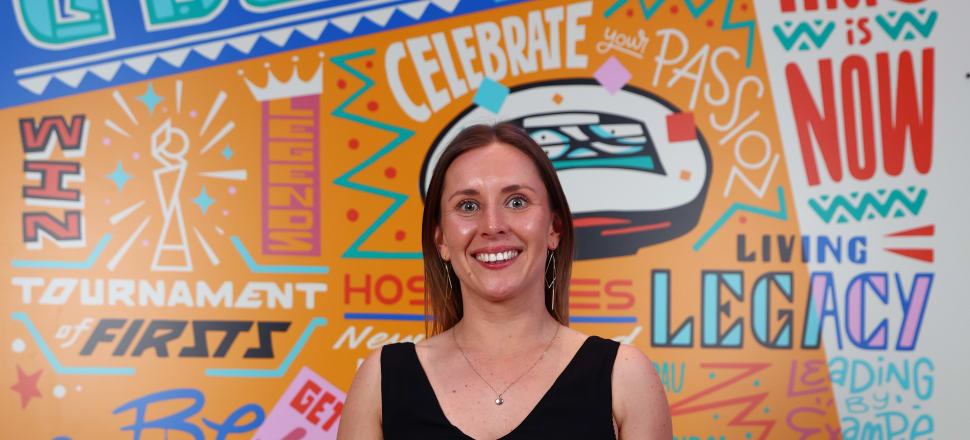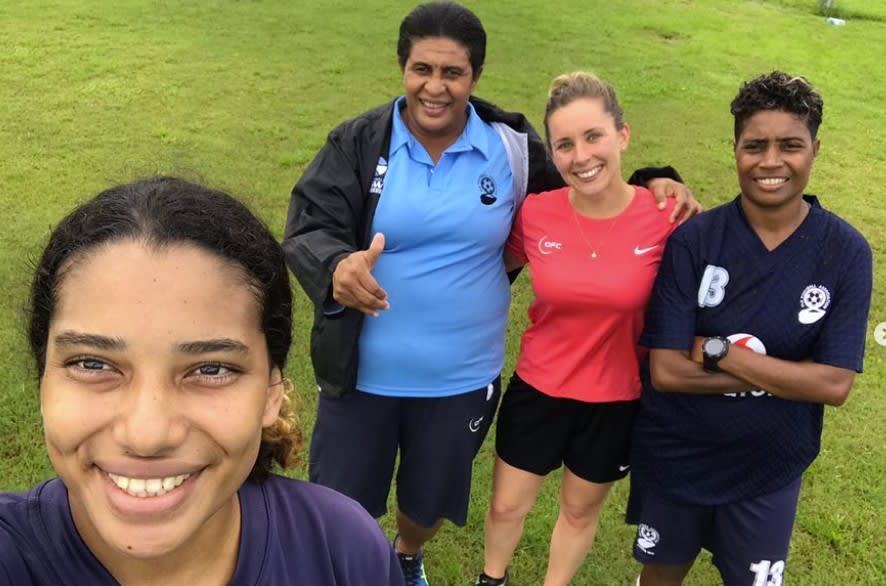
The FIFA confederation New Zealand belongs to is a vast geographical collection of 11 nations, with a Kiwi leading the push for the women's game, writes Aiden McLaughlin
For Emma Evans, a FIFA Women’s World Cup in New Zealand isn’t just a tournament to be savoured as a proud Kiwi. It’s much more than that.
As the Women’s Football Manager for the Oceania Football Confederation (OFC), Evans has 11 full member associations to look after.
With a geographical spread larger than Europe - the OFC covers American Samoa to Vanuatu, the Cook Islands to New Caledonia - it’s one of six continental confederations, but it’s different to the others.
“Our region is extremely unique and so special. It really does feel like you’re a family. Obviously when it comes to international competition it’s country against country, but when it comes to the development of the women’s game everyone really does work together,” says Evans.
“The countries share ideas, they’re in regular contact, it’s almost like we are one region working together to achieve the same goals rather than each individual country fighting to be at the top. We share resources, we share ideas, we share expertise, and it’s just such an enjoyable environment to be a part of,” she says.
Evans joined OFC at the beginning of 2019 as its Women’s Football Development Officer, after four years with Capital Football in Wellington. Then, in 2021, she took on her current role.
“When I started, I came in and four of the 11 countries had a women’s development officer, but there hadn’t been much guidance from OFC other than the competitions that were running, but in terms of the actual development there was a lot of work to be done,” says Evans.
“Over the next couple of years things started to evolve. We had a heavy focus on capacity building programmes and trying to actually grow the volunteer base of coaches, administrators, of people working in the women’s game, for that level of support to grow,” she says.
OFC has moved to having women’s development officers in every country, with at least one person dedicated to women’s football. Tonga now has four staff and Fiji has four women’s development officers. With more volunteers and people on the ground, there are significantly more people leading women’s football across those countries, not just in their main cities.
Covid hit the OFC region pretty hard. With international travel paused, it enabled Evans and the organisation to not only think about how far they had come in a couple of years, but also where the gaps were. Through that, they created ‘ALL IN’, the inaugural OFC Women’s Football Strategy, with a goal of having two competitive teams at the 2027 FIFA Women’s World Cup.

“For me, that was a really crucial point for women’s football across the Pacific. It was the first time ever we actually had a regionwide or confederation-wide strategy for growing women’s football and that process also identified that if we’re going to do this, then we also need to look at the structure of women’s football within OFC and my role morphed into more of a managerial role, hence the title change from Women’s Development Officer to Women’s Football Manager,” Evans says.
“The ALL IN strategy was created through until 2027. There were some key things we wanted to achieve over that time and then each year there’s a certain set of goals that progress that get us to that point and ultimately at the next Women’s World Cup we want to see two women’s teams performing,” she says.
In June this year, women’s football in the region took another step forward with the inaugural Oceania Women’s Champions League, held in Papua New Guinea. Six teams entered, but New Zealand’s representatives Eastern Suburbs withdrew late on, leaving five. AS Academy Feminine of New Caledonia took the title, coming from behind to beat Solomon Islands’ Koloale FC 4-1 in their final game.
“As a former player, a coach and in my role now, it is so special to have this competition up and running. It’s been a long time coming. We committed to hosting and launching the OFC Women’s Champions League in Papua New Guinea this year and when we had that in the strategy it was not only from a women’s football perspective but it was the competition team, the media team, the broadcast team, everyone knew what was required in order to bring this to life,” says Evans.
“The biggest thing for me in this was over the last couple of years ensuring that we were continuously lifting the criteria for entry into this competition to motivate the member associations to increase the standards of their national leagues."
While international football wasn’t happening because of Covid-related travel restrictions, it meant the focus had to shift onto OFC’s domestic programmes and local players at all levels.
“It’s really exciting getting out again now and seeing what’s taking place in the member associations. We’re seeing the introduction of more leagues, both regionally and nationally across the countries, more girls-only programmes, and also more girls being integrated into mixed football as well, so it’s really pleasing but I think across the Pacific, having that face to face interaction and getting to actually be there and see it and feel it, you just can’t compare that so it’s great to be out and travelling again,” says Evans.
With an OFC member association, New Zealand, acting as co-hosts for the upcoming Women’s World Cup, Evans is positive about the flow-on effect the event will have for women’s football in the region.
“I think this World Cup will show every person in New Zealand and Australia and hopefully across the Pacific just how big and powerful football is and especially women’s football,” she says.
“The Football Ferns are a huge inspiration to women across the Pacific. Seeing how they can compete on the global stage, seeing individual players, there are so many professional players now on contract, playing for some of the best clubs in the world, it definitely acts as a source of inspiration.
"I think this Women’s World Cup is going to be the most accessible it’s ever been across the Pacific. We’re creating fan zones across the Pacific where people will be able to watch."
Evans is delighted with the impact women administrators are having on the game at the highest level. With Sarai Bareman the Chief Women’s Football Officer for FIFA and former Football Fern Sarah Gregorius the Head of Global Policy at the player’s union FIFPRO, she wants another legacy of the tournament to be an increase in women from the region in those roles of influence.
“My hope in the next 10 years is that any time a woman gets into these spaces in football, that they understand the responsibility they have to pull other women up with them,” Evans says.
“I think one of the most special parts of this role is being able to create spaces for women to thrive and I hope that when my time is up in this role and I move on, that those that are standing in my position do the same for the next women, and I think that will have a bigger impact than any programmes or competitions that we launch.”







